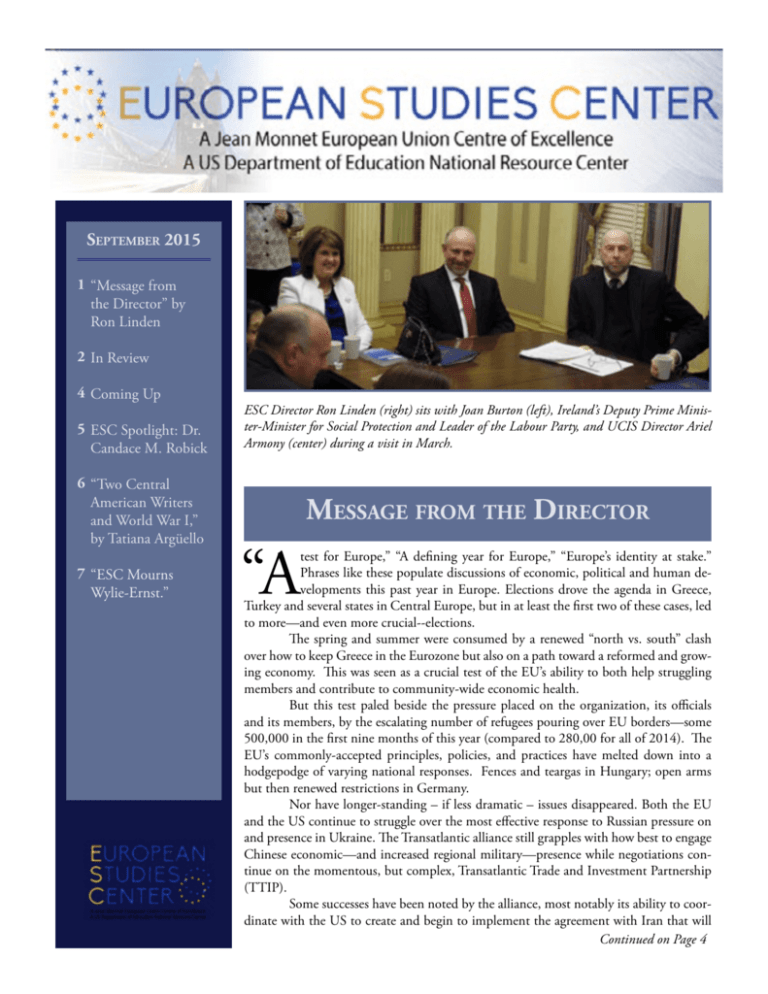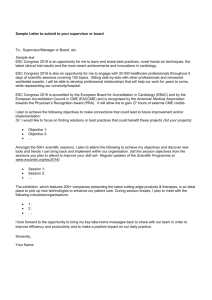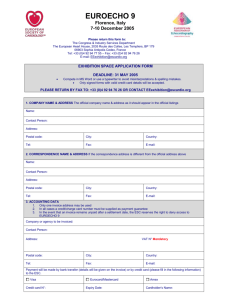September 2015
advertisement

September 2015 1 “Message from the Director” by Ron Linden 2 In Review 4 Coming Up 5 ESC Spotlight: Dr. Candace M. Robick 6 “Two Central American Writers and World War I,” by Tatiana Argüello 7 “ESC Mourns Wylie-Ernst.” ESC Director Ron Linden (right) sits with Joan Burton (left), Ireland’s Deputy Prime Minister-Minister for Social Protection and Leader of the Labour Party, and UCIS Director Ariel Armony (center) during a visit in March. Message from the Director “A test for Europe,” “A defining year for Europe,” “Europe’s identity at stake.” Phrases like these populate discussions of economic, political and human developments this past year in Europe. Elections drove the agenda in Greece, Turkey and several states in Central Europe, but in at least the first two of these cases, led to more—and even more crucial--elections. The spring and summer were consumed by a renewed “north vs. south” clash over how to keep Greece in the Eurozone but also on a path toward a reformed and growing economy. This was seen as a crucial test of the EU’s ability to both help struggling members and contribute to community-wide economic health. But this test paled beside the pressure placed on the organization, its officials and its members, by the escalating number of refugees pouring over EU borders—some 500,000 in the first nine months of this year (compared to 280,00 for all of 2014). The EU’s commonly-accepted principles, policies, and practices have melted down into a hodgepodge of varying national responses. Fences and teargas in Hungary; open arms but then renewed restrictions in Germany. Nor have longer-standing – if less dramatic – issues disappeared. Both the EU and the US continue to struggle over the most effective response to Russian pressure on and presence in Ukraine. The Transatlantic alliance still grapples with how best to engage Chinese economic—and increased regional military—presence while negotiations continue on the momentous, but complex, Transatlantic Trade and Investment Partnership (TTIP). Some successes have been noted by the alliance, most notably its ability to coordinate with the US to create and begin to implement the agreement with Iran that will Continued on Page 4 2 In Review 2015 Graduation Ceremony On April 26, the European Union Center of Excellence/European Studies Center held its graduation ceremony at the Pittsburgh Athletic Association; 25 undergraduate students and four graduate students received certificates. ESC Associate Director Allyson Delnore (left) speaks during the ceremony. ESC Assistant Director Stephen Lund (middle) congratulates an undergraduate student, and ESC Director Ron Linden (right) poses with KerryAnne Long, who received a West European Studies certificate. Belgian Ambassador Johan Verbeke Pictured right: ESC Director Ron Linden introduces Belgian Ambassador Johan Verbeke at a reception during his visit to the Center in April. Verbeke’s visit was a joint effort of the Belgian Honorary Consul, Anne Lackner (an ESC External Advisory Board member), GSPIA, and the World Affairs Council of Pittsburgh. His Excellency spoke about the challenges of multiculturalism in Belgium today. Europe: East & West Pictured left are the students who participated in “Europe: East & West.” Held in May’, it was an undergraduate research symposium co-sponsored by the ESC and the Russian and East European Studies Center. 3 Welcome Back Reception On Friday, Sept. 11, the ESC held its annual Welcome Back Reception. Pictured left, ESC Assistant Director Stephen Lund (middle) talks with Dr. Andrew J. Strathern (left) and Dr. Pamela J. Stewart (right) from the Department of Anthropology. Pictured right: attendees mingle around the buffet. Brittsburgh From Sept. 8-14, the ESC co-sponsored Britsburgh, a festival of Britain in Pittsburgh hosted by British-American Connections Pittsburgh. Britsburgh events included Ceilidh at the Chapel and Educating Rita at PICT Classic Theater. In support of the festivities, the EUCE/ESC staff posed with a cutout of Queen Elizabeth. Pictured above right: ESC Associate Director Allyson Delnore, Administrative Assistant Lizz Schellin, the Queen, Assistant Director of External Affairs Kate Bowersox, Outreach Coordinator Kathleen Ayers, and Assistant Director Stephen Lund. Pictured above left: Lizz Schellin and the Queen pose with two members of TrumPitts, which is the Pitt band’s trumpet section. 4 Coming Up Horizon 2 02 0 Horizon 2020 is the European Union’s €80 billion ($90 billion) research program. The University Center for International Studies at the University of Pittsburgh, in cooperation with BILAT USA 2.0, is hosting this special workshop open to all researchers from any discipline on how to receive funding through Horizon 2020. This free afternoon workshop will be held from 2:30-4:30 p.m. on Sept. 30 at 102 Benedum Hall, and it will provide specific information useful for U.S. researchers and institutions that are interested in participating in Horizon 2020. Researchers from all fields are encouraged to attend, as the program has calls relevant to the social sciences, natural and biological sciences, physical and informational sciences, and the humanities. Pre-registration is requested. Visit http://www.ucis.pitt.edu/esc/horizon2020 for more information. Conversations On Europe The next two installments of Conversations On Europe, the Centers’ monthly virtual roundtable series, will be held on Oct. 20 and Nov. 17, and the topics will be “Europe’s Jews: Past, Present, Future?” and “Rescue & Prevent: Responses to Europe’s Migration Crisis,” respectively. All Conversations will be held from 12-1:30 PM (Eastern Time) in Posvar Hall, room 4217, unless otherwise stated. This event is open to the public. To participate, please contact esc@pitt.edu. Europe Day Contest The Center is hosting a K-12 multimedia contest leading up to Europe Day on May 9, 2016. Students participating in the K-12 multimedia Europe Day contest can submit an essay, art portfolio, documentary, performance, or website related to the year’s theme, usually a significant EU-US policy issue. Selected winners will be awarded prizes and the opportunity to display their work at the annual Europe Day Festival. For more information, contact ESC Outreach Coordinator Kathleen Ayers at kma69@pitt.edu. Continued from Page 1 delay that country’s movement toward the capacity to develop a nuclear weapon. At the same time, President Obama’s securing of “fast-track” trade negotiation authority, though tied to the Trans Pacific Partnership (TPP), will undoubtedly help movement toward a final TTIP agreement. Our Center continues to support education on these and the full range of topics related to Europe and the Transatlantic relationship. We do so under a new name, as this Newsletter’s banner makes clear: The European Studies Center (ESC). Such a change was made due to two developments: •Our designation by the US Department of Education in the fall of 2014 as a National Resource Center in European Studies under Title VI of the Higher Education Act. We are one of only seven such centers in the United States. • The ending by the European Commission of its longstanding EU Centers of Excellence program—under which we had been funded for more than fifteen years. However, the staff of the ESC and with the support of UCIS, the Dietrich School of Arts and Sciences, and GSPIA, was able to craft no fewer than three new grants totalling almost a half million dollars, which will replace and extend the programs and activities of our Center. These include grants to establish a Jean Monnet Centre of Excellence, a Jean Monnet Program and, from the EU Delegation to the US, a “Getting to Know Europe” grant. Work in support of these successful competitions— and to continue our commitment to students, faculty and the Pittsburgh community—will be evidenced in the range of activities supported by our center. Please visit our website (http:// www.ucis.pitt.edu/esc/) to see the full list of programs, honors and events that are part of this commitment. I wish you all the best for the new academic year. Ron Linden ESC Newsletter: Director: Professor Ronald H. Linden Associate Director: Allyson Delnore Newsletter Editor: Gavin Jenkins For newsletter announcements, comments, or submissions, please email eucnews@pitt.edu. ESC would like to thank the European Union for support for the Center. 5 ESC Spotlight: Dr. Candace M. Robick Q: What inspired you to apply to the Brussels trip? A: Knowledge is the root to all learning. As an educator I am inspired to learn and to give the gift of learning to as many students as is possible. When I first heard of the Brussels trip to explore the European Union, I immediately became aware of the vast learning potential and opportunities that would be available for my students. I was interested in extending and challenging the knowledgebase of my students and enhancing their critical thinking skills through the pursuit of transatlantic communications with the European Union. I knew that actively engaging my students in thought-provoking academic activities and connecting them in high-interest EU activities would influence and impact their lives in the United States forever. The learning potential was limitless and priceless. Q: What were the most interesting parts of the trip? T his month, ESC Newsletter Editor Gavin Jenkins interviewed Dr. Candace M. Robick, a Pittsburgh teacher who participated in the ESC’s Study Trip to Brussels this summer. Dr. Robick starts a new job this fall, as Assistant Principal at the Urban Pathways Charter School. Previously, she was a Personal and Special Education (PSE) teacher at Pittsburgh’s Obama Academy of International Studies and Brashear High School. She has also taught in the South Park and Woodland Hills School Districts. She earned a PhD in Special Education from Walden University and has received master’s degrees from Edinboro University, Slippery Rock University, and Carnegie Mellon University. She earned a bachelor’s degree from Washington and Jefferson College. A native of Mars, PA, Dr. Robick is also a member of the Association of Supervision and Curriculum Design, as well as the Council for Exceptional Children. The ESC will sponsor a Study Trip to Brussels again in 2016. K-12 educators, community college professors, or faculty members at a Title III or Title V institution interested in participating in this upcoming summer’s trip, should contact Kathleen Ayers at kma69@pitt.edu for more information. A: The interactive sessions: we were permitted to ask questions of our speakers at various site visits including the European Commission, The European Parliament, Education, Audiovisual, and Culture Executive Agency (EACEA), European External Action Service (EEAS), Ecole Europeene de Bruxelles IV, and Bruegel, a Brussels think tank. Personally, I was interested in the Bruegel, which was designed to improve economic policy. It was started in 2005 and their mission is to contribute to the quality of economic policy making in Europe through open, fact-based, and policy relevant research, and analysis, and discussion. Bruegel’s emphasis is on policy recommendations rather than descriptive analysis or forecasts and they typically provide a global perspective. Their name is derived from the following method: BRUssels European & Global Economics Laboratory. I found it fascinating to learn that only 18 of the 28 European Union member Continued on Page 8 Note to ESC Alumni: Please keep in touch! We would love to hear about and celebrate your accomplishments. Send news of awards offered, grants received, books recently published, job appointments accepted, etc., to the Newsletter Editor at eucnews@pitt.edu. 6 Two Central American Writers and World War I by Tatiana Argüello, PhD candidate Department of Hispanic Languages and Literatures O ver the past two years, scholars have highlighted the World War I centennial by examining its political, economic, social, and cultural effects. Latin America’s connection is often overlooked, but there is a revitalization in academia to analyze the Great War’s impact on this region. With help from a generous ESC travel grant, I flew to Berlin last year and participated in the 17th International Congress of European Association of Latin American Historians (AHILA). As a panelist for “World War I and the role of Latin America,” I discussed how this devastating event transformed Latin America. I also presented my paper, “Poetics Representations of World War I: Rubén Darío and Salomón de la Selva,” which explores the experiences of two Central American authors during World War I with a transnational focus. In literature, war poetry about the trenches is frequently associated with writers from countries that had a direct involvement in the conflict. Therefore, my paper’s goal is to expand this perspective by including Latin American poets in the conversation with British writers, like Siegfried Sassoon and Wilfred Owen. My paper is Courtesy of WikiCommons Poet Rubén Darío. also part of my dissertation “Blurred Cartographies of Combat: Towards a Re-Articulation of War Literature in Central America,” which maps a trajectory of the multiple facets of war in Central American literature. I researched the emerging subjects in texts ranging from Modernist and Avant-garde poetry to guerrilla writings and postwar narratives, including those about street gangs and the fiction of narco trafficking. In my presentation, I analyzed the aesthetic representation of the horror of World War I in the work of Nicaraguan poets Rubén Darío (1867-1916) and Salomón de la Selva (1893-1959). De la Selva was the only Hispanic poet who enlisted with England in World War I, and he relived this event in his poetry book The Unknown Soldier (1922). In Darío’s posthumous book Political Chronicle, he weighed in with poems like “War” and “Madness of War.” These writers represent an aesthetic refutation of war. They mimic some discourses of modernity, such as Darwinian scientific discourse and the mercantilist aspect of war, and they give humane resignification to combatants in order to demystify the Great War as a civilizing catalyst for European progress. I argued that lyric subjects in their poems redefine war by inverting their experiences of violence in creative ways. These subjects contest war by crossing political categories, navigating between destructive and regenerative violence, humanizing war without participating in a collective agenda, and creating new symbolic possibilities for knowledge, relationships, and political action. The AHILA conference was a beneficial venue for my dissertation because of its focus on historic research in Latin America and Europe. I had the opportunity to meet scholars from different fields who gave me excellent feedback and bibliographic suggestions that will enrich historic components of my literary work. In addition, the organizers of my panel are planning to publish a book about the impact of World War I in Latin America. I was invited to participate in this project, so my article will contribute to the literary perspective of this theme, which also includes different approaches such as health, media communication, political science and gender. I’m grateful to the ESC for helping me defray my travel expenses to this conference. My participation contributed to my goal in promoting the study of war literature in the region and proposing alternative readings to existing scholarship on Central American authors in order to put this theme into debate at both a local and a global level. € 7 ESC Mourns Wylie-Ernst I n July, the ESC lost a good friend and welcome colleague when Dr. Elizabeth Wylie-Ernst passed away after a battle with cancer. She was 55. A professor in the Department of German, Dr. Wylie-Ernst worked closely with our staff on many projects through the years. Her devotion to students was inspiring, and her knowledge and skills led to many new initiatives and resources that supported students, not only in the German Department, but European Studies and foreign language departments across campus. Dr. Wylie-Ernst grew up in Pittsburgh’s South Hills and received a bachelor’s in French and German, and a master’s and PhD in German from the University of Pittsburgh. As a student, she participated in Pitt’s Student Exchange program with the University of Augsburg and also studied at the Friedrich-Wilhelms-Universität in Bonn on an Exchange Fellowship. These were formative experiences that she promoted to subsequent generations of students at Pitt. Dr. WylieErnst’s dissertation was titled “Frau Holle and the Re-Creation of Myth” and written under the direction of Professor D. L. Ashliman. It traced the folkloric and literary origins of the Frau Holle figure and refuted the popular conception of the “didactic agenda” in Grimms’ fairy-tales. After earning a Ph.D., Dr. Wylie-Ernst continued to teach at Pitt, starting as a part-time lecturer and ultimately becoming a Lecturer II. She was an exceptional teacher and received the Provost’s Award for Excellence 2007-2008, was nominated for countless other teaching awards, and made the SGB Faculty Honor Roll in 2000 and 2001. She regularly taught the large-enrollment courses in the German Department: “Indo-European Folktales” and “Germanic Myths, Legends, and Sagas.” She taught the most students of any faculty member in the German Department, and her teaching evaluations were consistently excellent. Dr. Wylie-Ernst was tireless in her service to students, the German Department, and the university. She loved interacting with students, which she did as the Teaching Assistant/ Teaching Fellow Coordinator, the Director of Undergraduate Studies, the Director of Language Studies, and the German Club Liaison. As a graduate mentor, she instructed students on the finer points of pedagogy. In remembering her, a number of former graduate students voiced the same sentiment: “She taught me how to teach.” Undergraduate students described her as “an amazing professor, definitely the star of the German department.” A former student said Dr. Wylie-Ernst was “one of the reasons I stayed at the University of Pittsburgh, a force of nature in the German Department,” while another former student credited her as “the reason I studied in Augsburg and had the best experience of my undergrad years.” Above all, though, her classes were always fun, creative, and thought-provoking. Dr. Elizabeth Wylie-Ernst passed away in July after a battle with cancer. She was an excellent teacher and a great friend to the ESC. Dr. Wylie-Ernst’s service also included responsibility for the German portion of Pitt’s College in High School program and the Lern Deutsch School Outreach Program, committee membership on the Media Center Advisory Board, and serving as an evaluator for Fulbright/DAAD language evaluations. She was an invaluable colleague who built bridges across departments and programs at the university, and was conscientious in her efforts to do her best in everything she did. The German Department has established the German Legacy Fund in memory of Dr. Wylie-Ernst, with the aim of helping the Pitt students to whom she was so devoted. “For many of our students Beth was the heart of the department,” said Randall Halle, Klaus W. Jonas Professor of German Film and Cultural Studies and Chair of the Department. “For me and the other members of the faculty Beth was a valued colleague and we all miss her dearly. On the Friday before Labor Day, we held a memorial for Beth on campus and the room was overflowing with people who came to share memories and say farewell. Repeatedly friends and colleagues recalled her dedication and her generosity, her intelligence and her compassion. I remember in our quotidian interactions that Beth was always ready to listen and always ready to respond with insightful advice. People have responded to Beth’s passing with a generosity of their own. The Elizabeth Wylie-Ernst Memorial Fund is moving to becoming an endowed fund in record time. It will be used to continue Beth’s legacy with the students in the German program.” For more information on the Elizabeth Wylie-Ernst Memorial Fund, including ways to contribute, please visit https://secure.giveto.pitt.edu/wyern. € 8 Continued from Page 5 Although not all countries are in agreement, some EU states fund it. member countries are more proactive in developing pro Additionally, I was interested in attending Ecole gramming and welcoming and accepting migrants into Europeenne de Bruxelles IV [one of 14 European scools] their countries. I would explore this situation as a way to because I wanted to learn more about the school system in work on the concept of different opinions and develop Brussels. The school system was very well organized aca- debate conceptualizations in the classroom. demically and included education based in the students’ mother tongue as well as in French. The three basic lan- Q: Why is it important for high school students to study guages that they have available are English, Dutch, and Europe and the European Union? French. As funding becomes available, they are providing students with teachers of other languages, such as Roma- A: I believe that it is important for high school students nian and Estonian. The American military families send to study Europe and the European Union so that they their students to this school, which is a European Union can remove themselves from a United States mindset. It based school and it is rich with academic exposure. is important in life that students remember that they live in a big interconnected world and that what happens in Q: In what way can you incorporate what you learned in other parts of the world will affect their lives in the United your classroom? States. I believe it is important for students to become familiar with transatlantic idiosyncrasies, communications, A: The migrant crisis in Europe is a perfect example. I and to know and to learn how closely they are interconwould teach the varying viewpoints of the EU members. nected in order to understand the big picture in life. € University of Pittsburgh University Center for International Studies European Studies Center 4200 Posvar Hall Pittsburgh, PA 15260 Phone: 412-648-7405 Fax: 412-648-2199 E-mail: esc@pitt.edu www.ucis.pitt.edu/esc.html NON-PROFIT ORG. U.S. POSTAGE PAID PITTSBURGH, PA PERMIT NO. 511




